Pre-employment screening helps recruiters find top talent and understand candidates' skills. It's a key step in building a strong team.
This guide compares Adaface and Codility, two popular assessment platforms. We'll explore their features to help you choose the right tool for your hiring needs.
Table of contents
How does Adaface work?
Adaface is a leading platform for pre-employment assessments, helping companies screen candidates using customized skill tests. Our approach ensures a balance between coding challenges and scenario-based multiple-choice questions, providing a holistic view of candidates' capabilities.
Recruiters love Adaface because it tailors assessments to specific job descriptions. This means they can evaluate candidates on the exact skills required for the role, enhancing the accuracy and relevance of the hiring process. Such precision is super helpful when hiring for specialized roles.
Another reason recruiters choose Adaface is our conversational interface, which creates a friendly and engaging candidate experience. This not only reduces candidate drop-off rates but also provides a more realistic measure of a candidate's interpersonal skills and problem-solving abilities.
One standout feature is our robust remote proctoring features Ensure accurate assessments with remote proctoring features, which include webcam and browser monitoring to ensure test integrity. The platform also supports multiple languages, making it perfect for global recruitment needs Adaface Online Assessment Platform | Adaface product tour.
How does Codility work?
Codility is an assessment platform designed for evaluating tech talent, especially engineers. It offers coding tests that focus on measuring a candidate's problem-solving abilities and coding skills.
Using Codility, you can create tests via CodeCheck, pair-program with candidates using CodeLive, or host coding events like hackathons through CodeEvent. These features aim to streamline the recruitment process for tech roles.
Codility provides a variety of coding questions, including those focused on data structures, algorithms, web frameworks, and mobile frameworks. Automated scoring and code playback features are also available to help reduce manual review time.
However, Codility does have a few limitations such as the absence of business, personality, and language tests, which can be crucial for evaluating diverse candidate skill sets.
Adaface vs Codility: Test libraries
Both Adaface and Codility offer extensive test libraries. While Adaface provides a wide range of assessment types including coding questions and scenario-based MCQs, Codility primarily focuses on programming tests.
Using these test libraries can streamline the hiring process by assessing candidates’ skills before scheduling interviews. This helps in making more informed hiring decisions and reducing employee turnover.
Adaface's test library
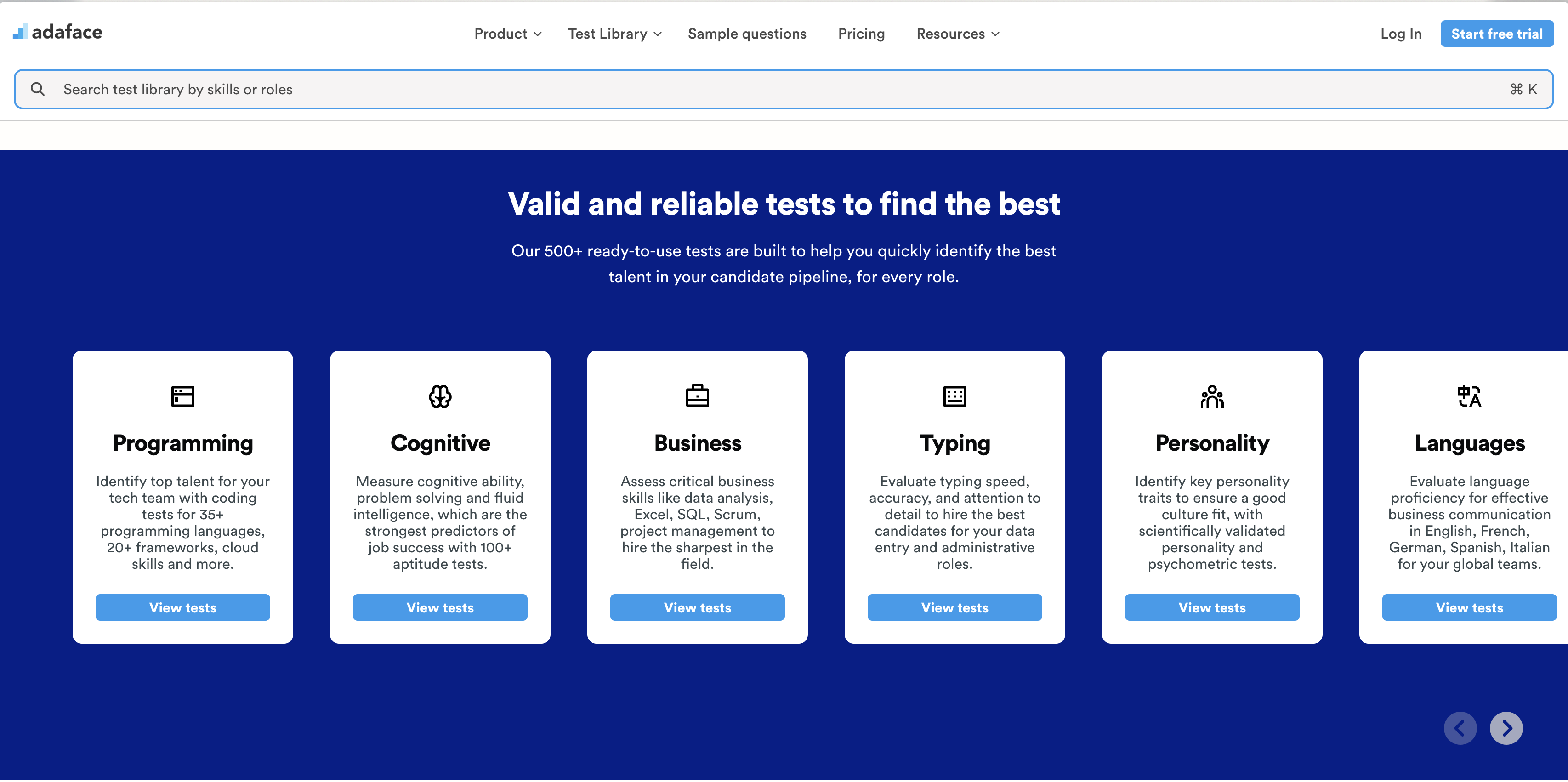
Adaface’s test library includes a diverse set of assessments covering over 500 skills. Recruiters use Adaface to assess candidates in areas such as programming, cognitive ability, business skills, and personality traits.
You can measure with Adaface’s tests:
- Programming skills with coding questions and scenario-based MCQs
- Business skills like Sales, Marketing, and Project Management
- Language proficiency across major languages like English, French, and German
- Personality traits and cognitive abilities
Recruiters use Adaface’s test library because it allows for creating customized tests based on job descriptions. Additionally, it provides ready-to-use tests that can be immediately deployed for quick assessments.
To see Adaface’s test library in action, visit the Pre-Employment Assessment Test Library for detailed information. For IT and programming tests, click here, or explore our Artificial Intelligence tests.
Codility's test library
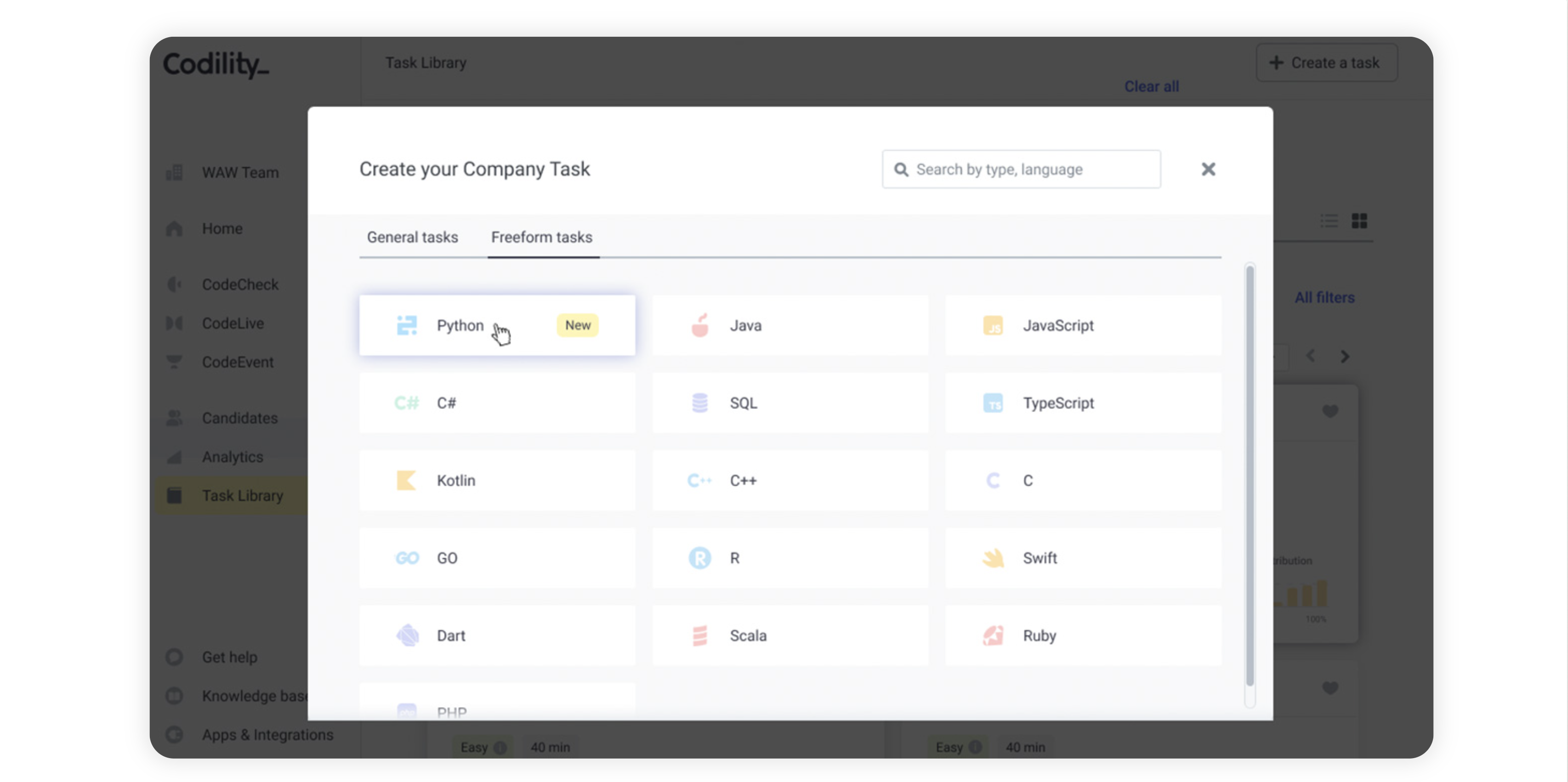
Codility offers a library of over 90 coding language and technology tests, covering HTML, JavaScript, Python, C++, and more. Employers can create custom questions in multiple formats such as multiple-choice and essay.
Codility's recruitment library includes over 1000 tasks. This allows employers to mix and match tasks or create custom coding challenges for their applicants.
However, Codility's test library lacks assessments for situational judgment, aptitude, personality, and business skills. There are no tests for non-technical skills or job-specific scenarios, limiting its scope for diverse hiring needs.
Comparison of test libraries
Adaface vs Codility: Developer hiring
When hiring developers, recruiters need to evaluate a myriad of skills to ensure the right fit for their teams. Platforms like Adaface and Codility offer functional assessments that help in this crucial task.
Adaface provides a mix of coding questions and MCQs to comprehensively assess a candidate's skills, while Codility focuses more on algorithmic challenges and project-based coding tasks, which can be time-consuming.
Hiring developers with Adaface
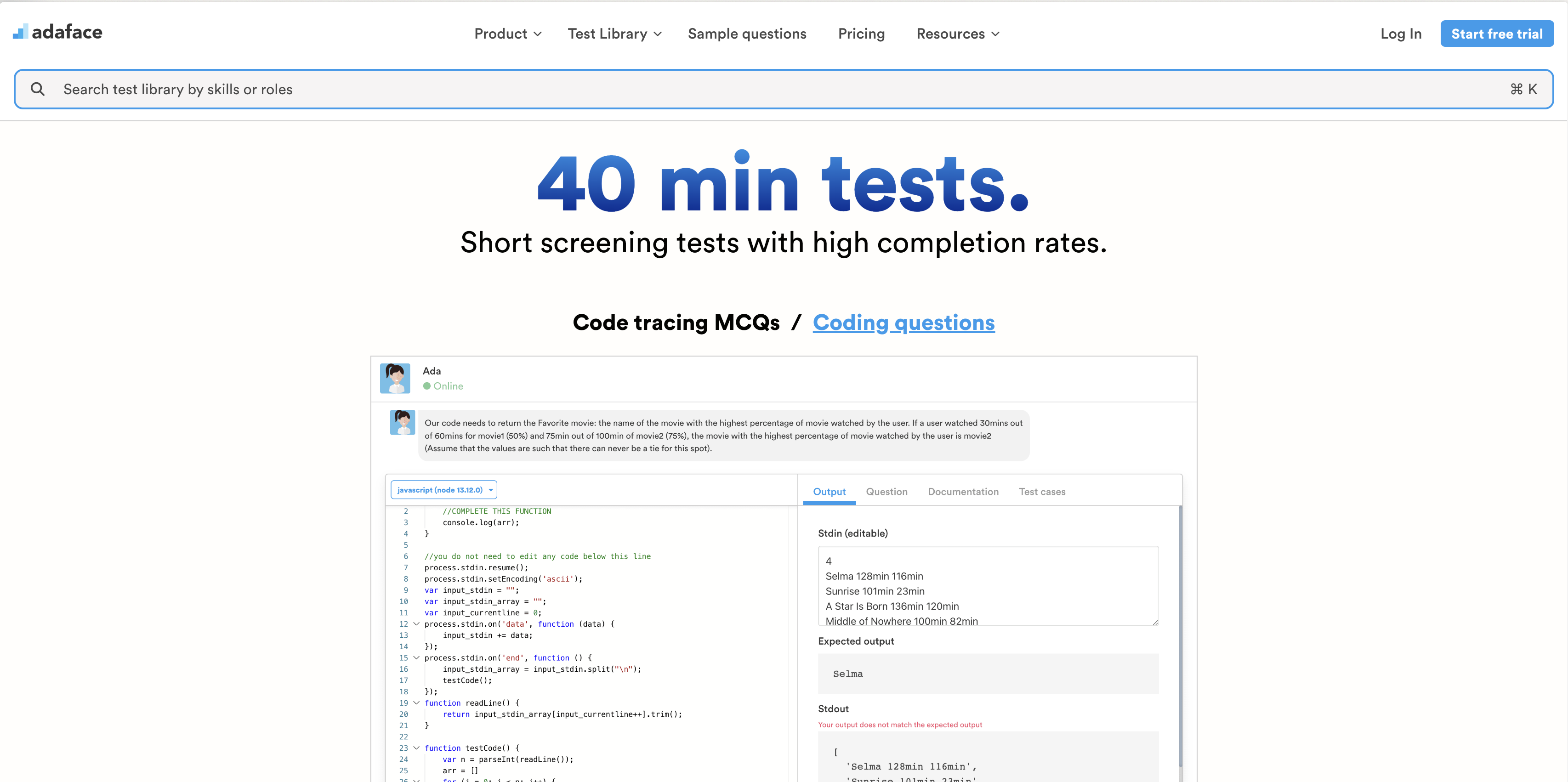
Adaface's test library is designed to make hiring developers a breeze:
- Web and mobile framework questions
- Data Structures and Algorithm questions
- Code playback and automated scoring features
Recruiters use Adaface to streamline their hiring process and accurately gauge a candidate's practical skills in a variety of scenarios.
Additionally, Adaface's unique offerings, such as the ability to create custom coding questions and see code playback timelines, provide a more holistic view of a candidate's capabilities. These features ensure that recruiters can make informed decisions swiftly.
Hiring developers with Codility
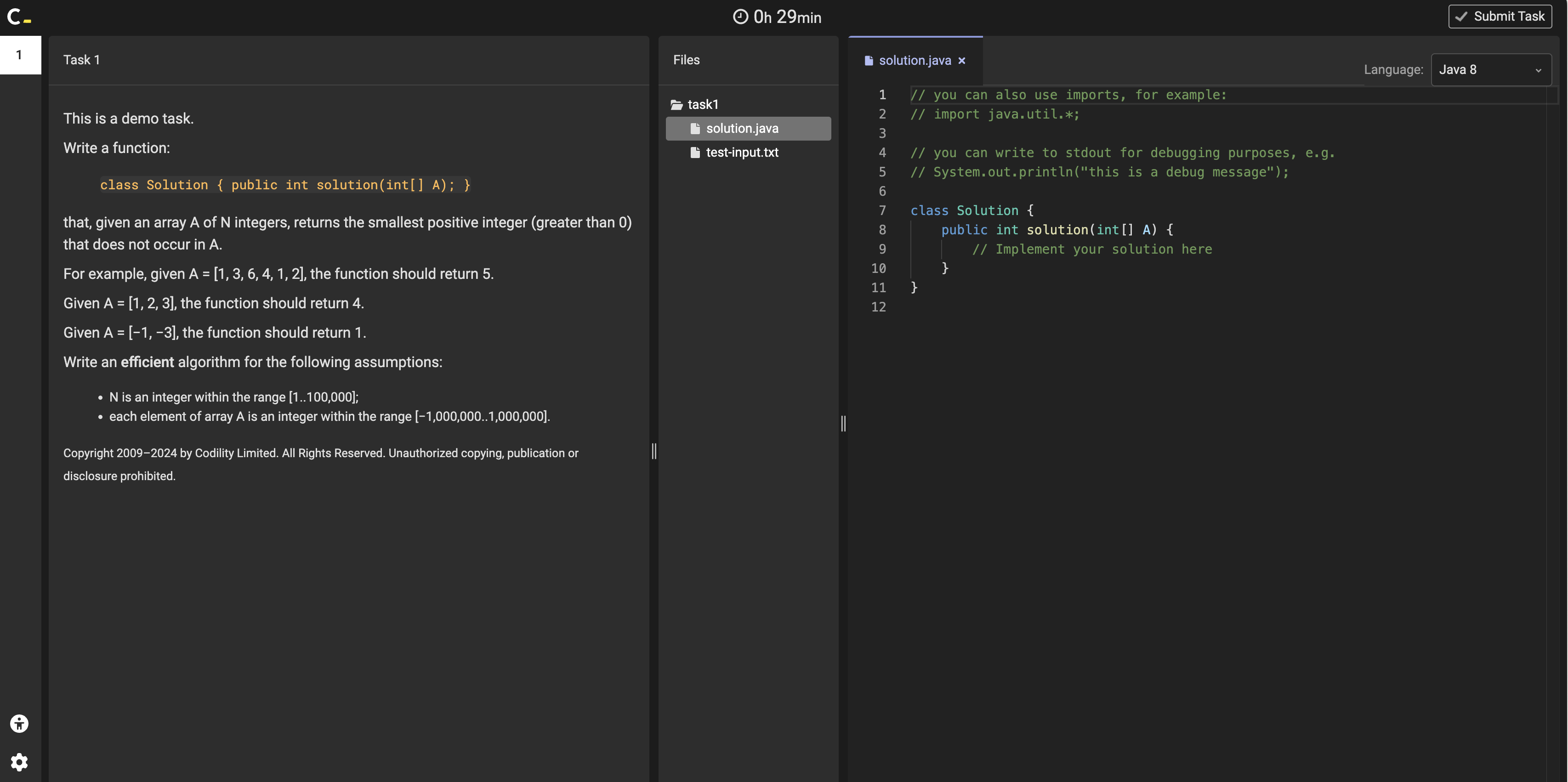
Codility supports a wide array of programming assessments, boasting over 90 coding languages and a recruitment library filled with more than 1000 tasks. This extensive selection is designed to evaluate candidates' problem-solving abilities and technical knowledge, allowing employers to create custom tests tailored to their needs.
Employers can leverage Codility's job-specific testing feature, CodeCheck Template, to mix and match tasks or craft unique challenges for applicants. This flexibility helps ensure that candidates are assessed on skills relevant to the specific role they're applying for, making the hiring process more targeted.
However, while Codility provides a solid test library, it lacks some key features that could enhance the developer hiring experience. For instance, candidates' coding processes aren't recorded for later review, which can make it challenging to gauge their thought process during assessments.
Comparison of developer hiring features
Adaface vs Codility: Candidate experience and company branding
Candidate experience and company branding play a significant role in the recruiting process. A positive experience ensures candidates view your organization favorably, whether or not they get hired.
Important features to consider include test length, ease of use, support availability, and mobile-friendliness. Seamlessly integrating your company's branding within the assessment process can also enhance the overall candidate experience.
Candidate experience and company branding with Adaface
Adaface offers a conversational interface, making assessments feel like engaging discussions rather than daunting tasks. This approach can boost candidate engagement and satisfaction, making your brand more appealing.
Adaface's assessments are mobile-friendly, enabling candidates to complete tests on the go. This flexibility can lead to higher completion rates, particularly among tech-savvy candidates.
Adaface provides customizable templates for invitations, shortlists, and rejection emails. This feature allows you to maintain a consistent brand voice throughout the recruiting process, further enhancing your company's image. For more insights, check out How to Setup an Effective Coding Test.
Candidate experience and company branding with Codility
Codility does provide a standard candidate experience, allowing applicants to complete assessments without downloads or extensive technical barriers. However, their assessments can feel more like traditional tests—think of it as a less-than-fun pop quiz—making it less engaging for candidates.
In terms of company branding, Codility allows the integration of company logos and colors, which is a step in the right direction. However, the lack of customizable templates for shortlist and rejection emails means that your organization's voice may be lost in translation, making communication feel less personal.
A top-notch candidate experience paired with solid company branding can create a memorable hiring journey. Imagine a candidate completing an assessment that feels friendly and aligns perfectly with your company's ethos—this can set the stage for a positive first impression. Yet, Codility's absence of features like qualifying questions and a conversational interface leaves room for improvement, as candidates might not feel as connected to the hiring process.
Adaface vs Codility: Anti-cheating features
In today's digital age, ensuring the integrity of online assessments is crucial. Recruiters need robust anti-cheating measures to maintain fairness and accurately evaluate candidates' skills.
Anti-cheating features of Adaface
Adaface offers a comprehensive suite of anti-cheating features to ensure the validity of your assessments. Here are some key highlights:
- User authentication: Candidates must verify their identity before starting the test, preventing unauthorized access.
- Time limits and full-screen mode: Tests have time restrictions, and candidates are required to stay in full-screen mode, minimizing opportunities for cheating.
- Webcam and browser proctoring: Adaface monitors candidates' webcams and browser activity, detecting any attempts to access unauthorized resources or receive outside assistance.
Additionally, Adaface incorporates advanced measures like location logging, IP and device fingerprint tracking, and copy-paste protection to further safeguard the assessment process. The platform also offers multiple question sets to mitigate the risk of leaked questions, and leverages social listening to proactively address any potential breaches.
Anti-cheating features of Codility
Codility offers several proctoring features such as user authentication, webcam monitoring, and time limits on tests. These tools help ensure that candidates are who they claim to be and complete assessments under controlled conditions.
The main selling point of Codility's proctoring is its ability to track user activity and monitor webcam feeds, which can deter cheating by making candidates think twice before attempting to collaborate with others or look up answers online.
However, Codility lacks certain advanced anti-cheating features like full-screen proctoring and device fingerprint tracking, which can leave some gaps in their monitoring capabilities. This might give savvy candidates an edge, allowing them to exploit those weaknesses during assessments.
Comparison of anti-cheating features
Adaface vs Codility: Pricing and free trial
Pricing for assessment platforms can vary widely, depending on the scale and specific features you need. Recruiters should expect a range of options to suit different hiring needs and budgets.
Adaface pricing
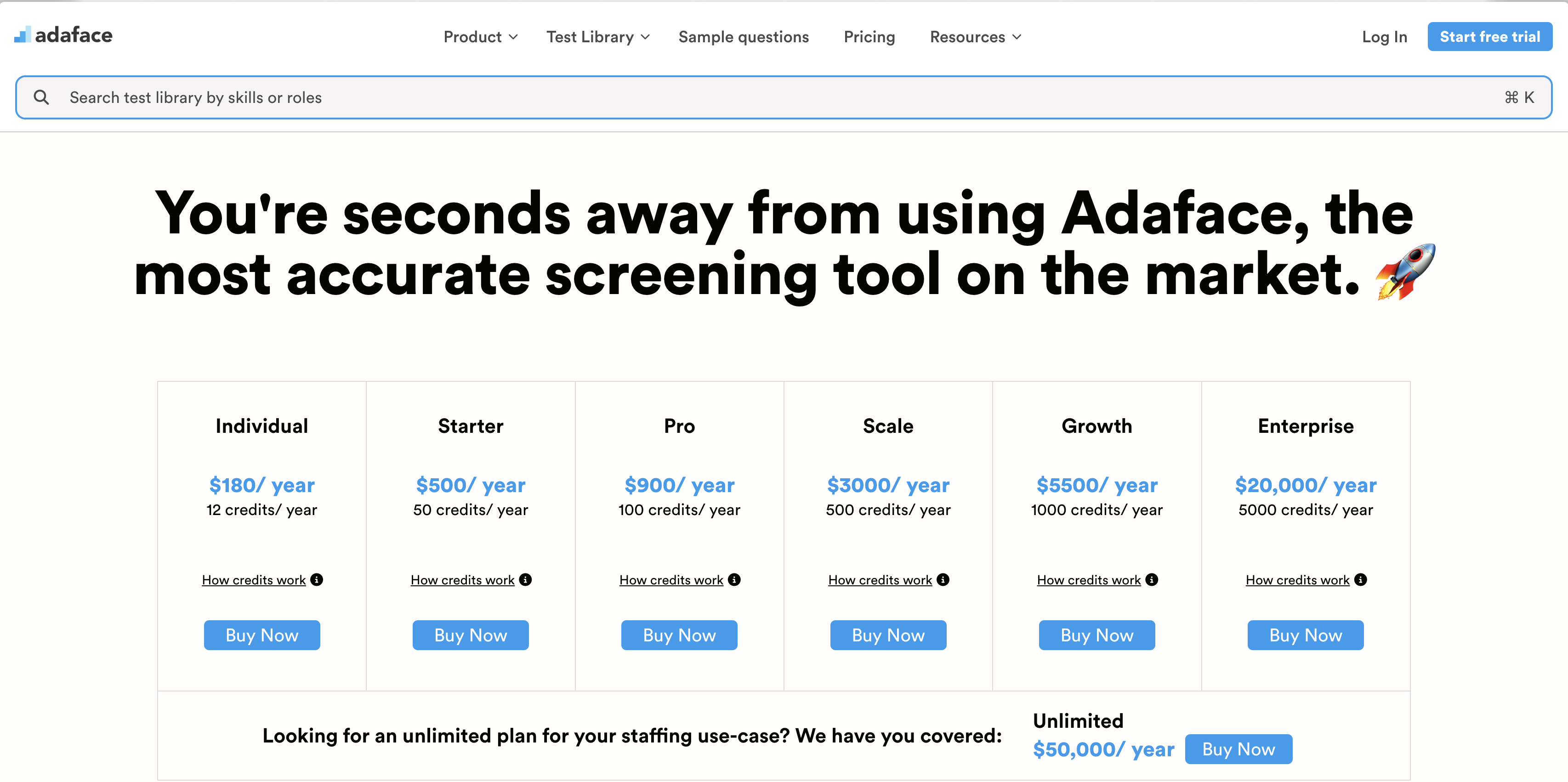
Adaface offers a transparent and flexible pricing structure. We provide four main plans to cater to different hiring volumes and requirements:
- Starter: $500 for 50 credits
- Scale: $3000 for 500 credits
- Growth: $5500 for 1000 credits
- Enterprise: $20000 for 4000 credits
For teams with extensive hiring needs, we also offer an Unlimited plan at $50000 per year. Each plan is designed to scale with your hiring process, ensuring you only pay for what you need.
Companies can easily sign up and start using Adaface without the hassle of waiting for sales calls. We also provide a free trial to let you explore all features before committing to a plan.
Codility pricing
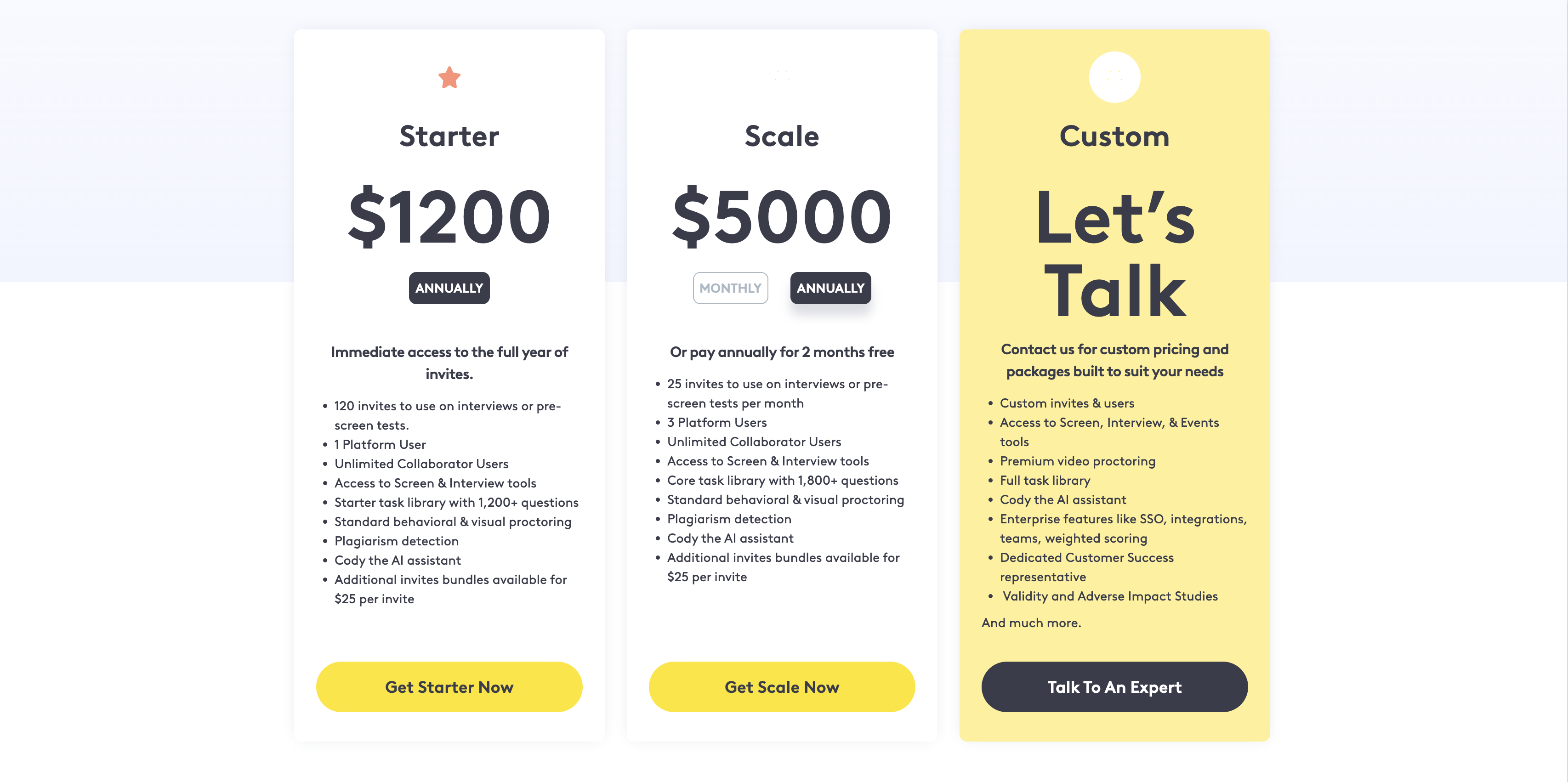
Codility offers three main pricing tiers for its assessment platform. The Starter plan is priced at $1200 per year, providing basic features for smaller teams or companies just beginning their tech hiring journey. For growing organizations, the Scale plan is available at $5000 annually, offering more advanced features and higher usage limits. Larger enterprises or those with specific needs can opt for the Growth plan, which requires contacting Codility's sales team for a custom quote. Each plan likely includes a set number of assessments, though specific details aren't publicly available.
While Codility's pricing structure covers different company sizes, it may not be the most flexible option for all hiring needs. The lack of a monthly billing option or a pay-as-you-go model could be limiting for companies with fluctuating hiring patterns. Additionally, the absence of a free trial or self-serve sign-up process might make it challenging for potential customers to fully evaluate the platform before committing to a purchase. Companies looking for more adaptable pricing or easier platform exploration might find these aspects restrictive.
Comparison of pricing
Adaface vs Codility: Scorecards, reporting and analytics
Scorecards, reporting, and analytics features are key for recruiters to make data-driven hiring decisions. A good assessment platform should provide clear, detailed reports that are easy to share and interpret, helping teams quickly identify top candidates.
Adaface scorecards, reporting and analytics
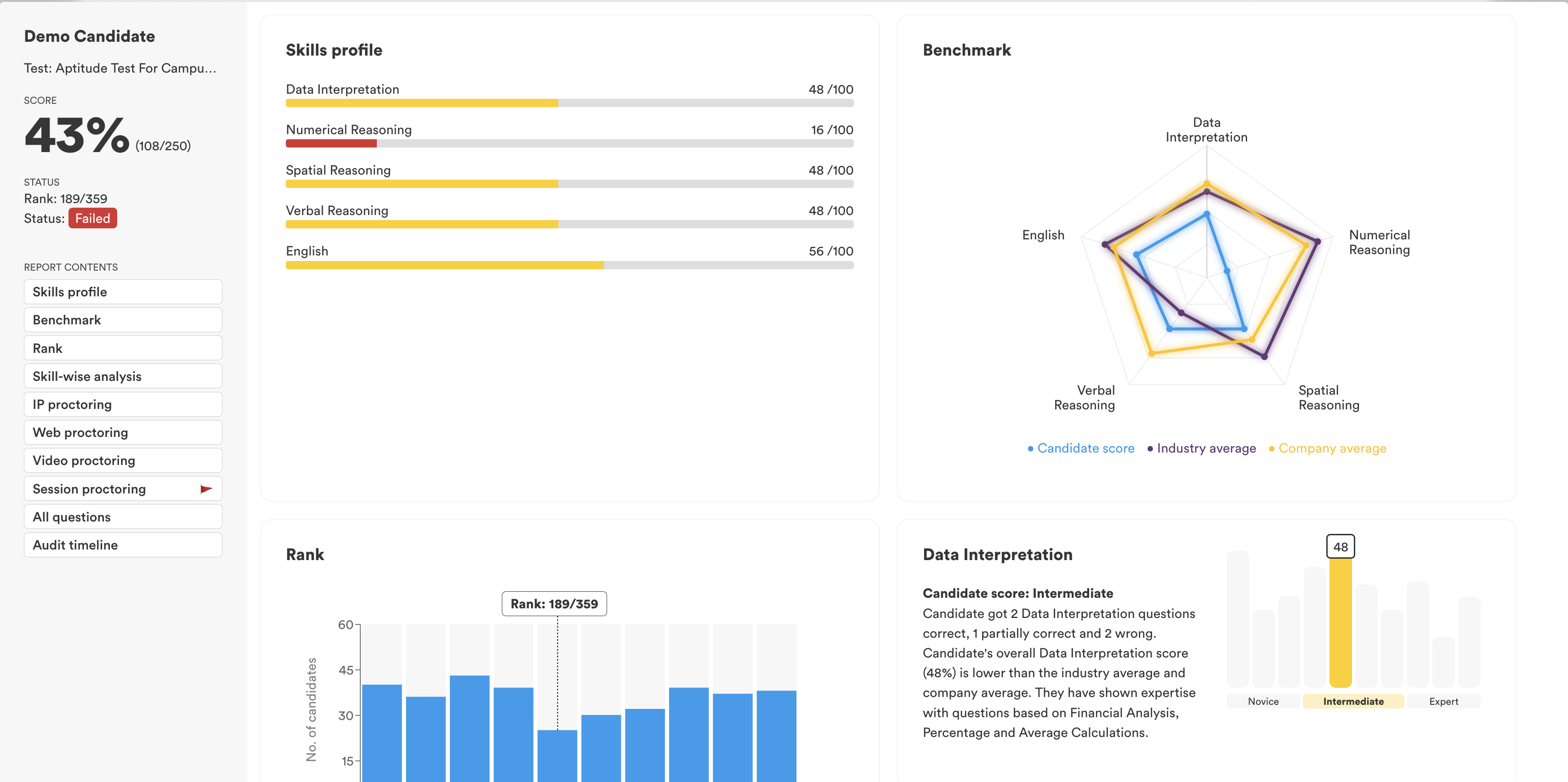
Adaface offers a range of powerful reporting tools to streamline your hiring process. The platform generates detailed PDF reports that can be easily shared with your team or clients. You can also access public report links, making it simple to share results without requiring login credentials.
With Adaface, you get a skills profile for each candidate, showing performance across multiple skills in an easy-to-understand format. The platform also provides skill-wise analysis, breaking down scores by category to help you quickly assess a candidate's strengths and weaknesses.
Codility scorecards, reporting and analytics
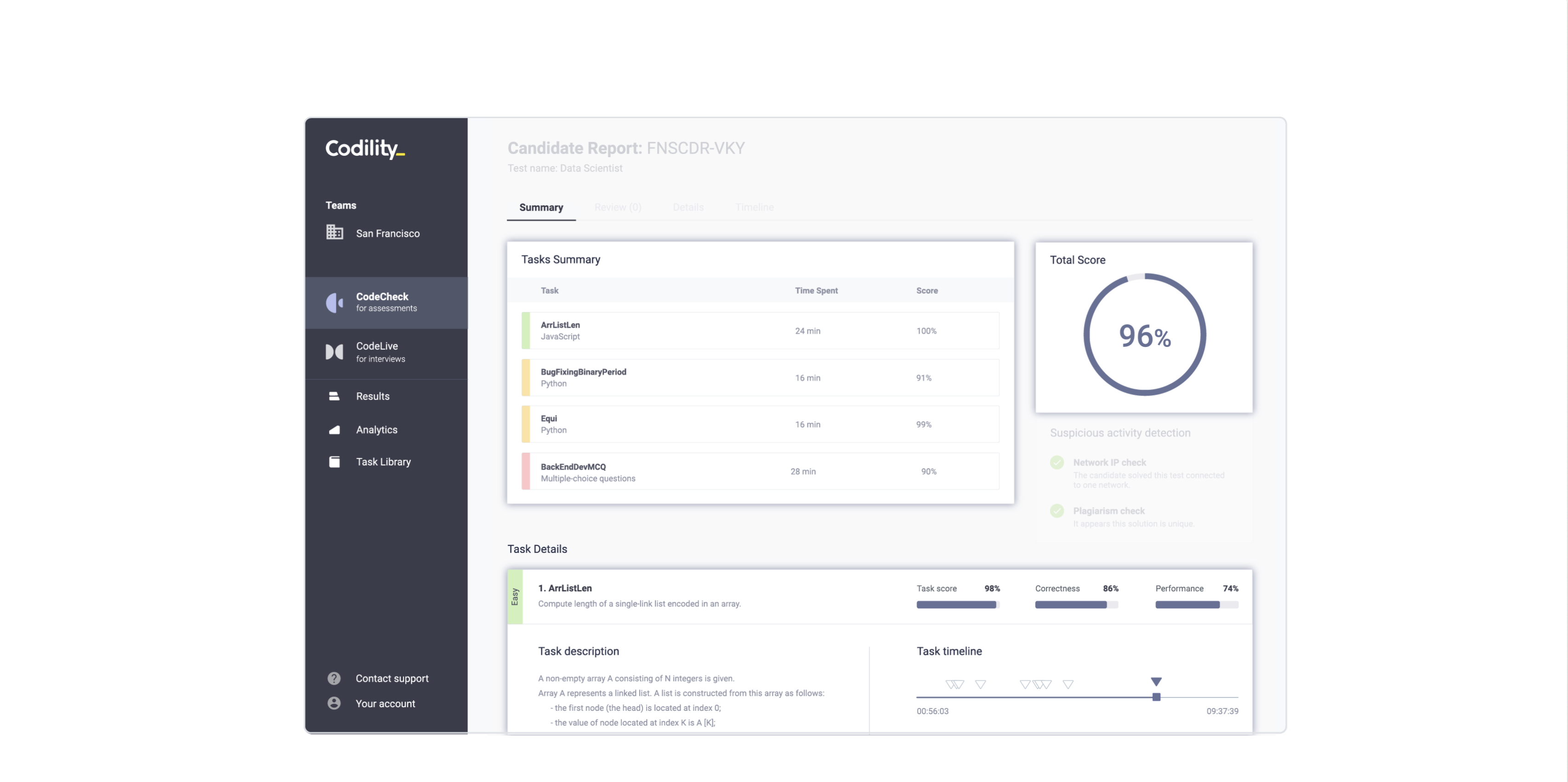
Codility provides detailed reports showing each candidate’s overall score and their performance on individual tasks. Their reports also include a timeline view that illustrates every step the candidate took to complete their test.
Codility allows you to share candidate reports within your Applicant Tracking System (ATS) or download them as PDFs. Additionally, you can add one rating and one note of recommendation per candidate for internal review purposes.
While Codility offers some useful reporting features, it lacks options for sharing reports publicly via unique links and does not support Excel or CSV exports. This means recruiters might find it challenging to share candidate data easily with external stakeholders.
Comparison of scorecards, reporting and analytics
Adaface vs Codility: Enterprise and startup friendliness
When it comes to enterprise and startup friendliness, an ideal product should seamlessly integrate with existing systems, ensure data compliance, and offer scalable features that grow with your business. After all, whether you're a scrappy startup or an established giant, you need tools that adapt to your unique hiring needs.
Adaface's enterprise and startup friendliness
Adaface stands out by providing unlimited team seats across all plans, allowing enterprises to scale their hiring efforts without worrying about rising costs. This feature is particularly appealing for startups looking to expand quickly without being bogged down by additional fees.
Another notable feature is Adaface's custom API, which offers enterprises the flexibility to integrate with their existing HR systems or develop tailored solutions. Codility, on the other hand, does not provide this capability, making it less adaptable for companies requiring specific integrations.
Startups will appreciate Adaface's multiple invite options, enabling recruiters to invite candidates through various channels with ease. This flexibility helps streamline the hiring process, while bulk actions allow companies to efficiently manage candidates, a feature that Codility lacks. For more details, explore our features.
Codility's enterprise and startup friendliness
Codility offers enterprise-friendly features like ATS integrations, GDPR compliance, and role-based access, making it suitable for both large enterprises and startups.
For companies aiming to conduct campus recruitment events, Codility provides gamified challenges and hackathons, which can be a great way to engage with potential hires.
However, Codility lacks some key enterprise features such as custom API access and bulk actions, which can limit flexibility and efficiency for large-scale hiring initiatives.
Comparison of enterprise and startup friendliness
Adaface vs Codility: Customer support
Adaface vs Codility: Customer support is a critical factor for recruiters using assessment platforms. It ensures that users can make the most of the platform's features and resolve any issues quickly.
Adaface's customer support features
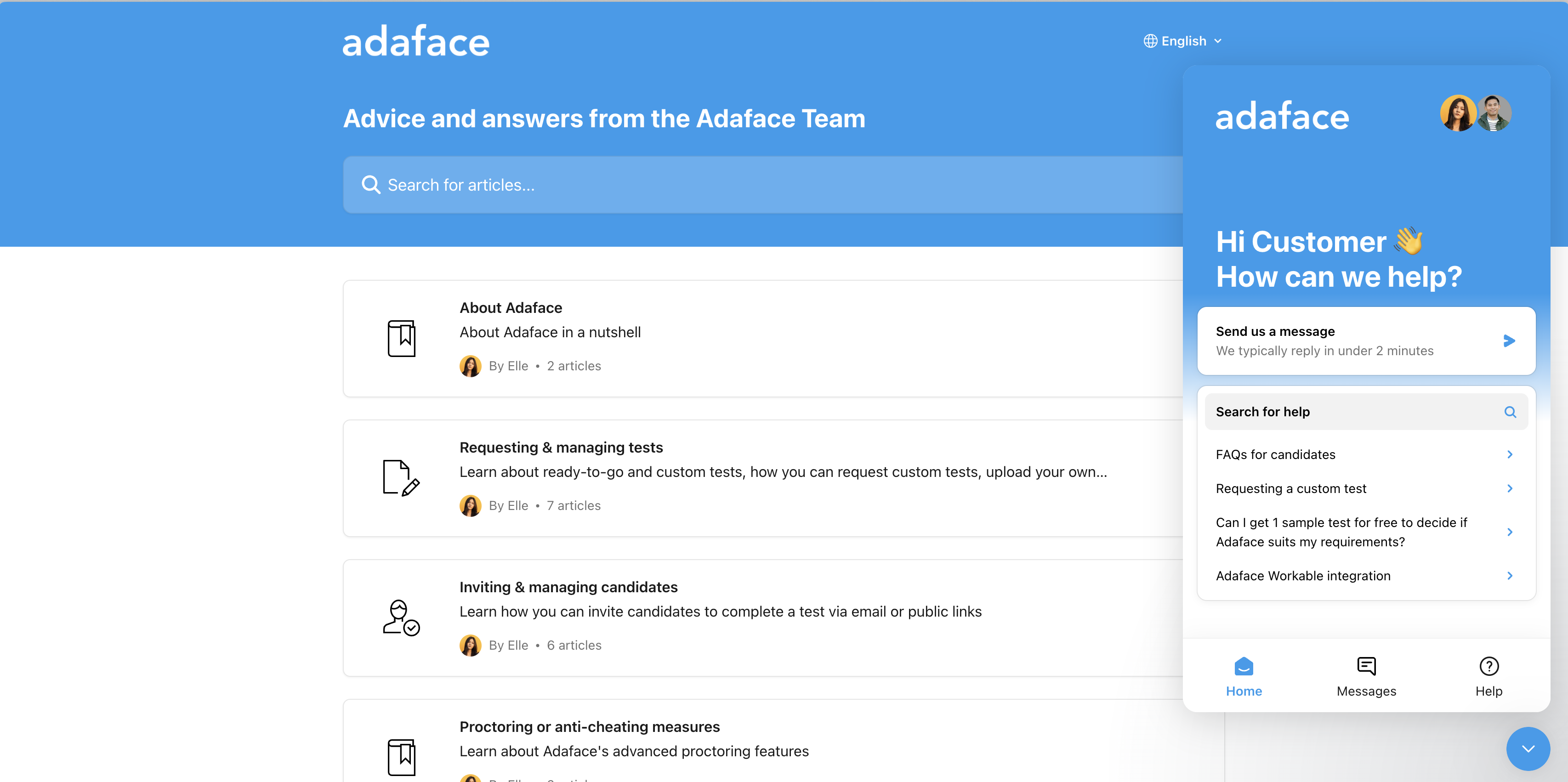
Adaface's customer support offers multiple channels including email support, live chat, and phone assistance. This ensures recruiters can get help in real-time whenever they need it.
We provide a dedicated priority support option for enterprise customers, offering a direct point of contact for quicker resolution and communication. This makes handling large-scale hiring processes smoother.
Our Help Center is packed with FAQs, how-to guides, and tutorials, enabling recruiters to find answers autonomously. Additionally, we offer comprehensive onboarding and training sessions to help you get started seamlessly.
Codility's customer support features
Codility offers email support and a help center to assist users with their queries and troubleshooting needs. They also provide training and onboarding to help recruiters get started with the platform.
However, Codility lacks live chat and phone assistance, making it harder for users to get immediate help when needed. Additionally, it's unclear if they offer dedicated priority support for higher-tier plans.
Comparison of customer support
Adaface vs Codility: Final verdict
Both Adaface and Codility offer coding tests and automated scoring. They also provide ATS integrations and support multiple programming languages.
However, Adaface stands out with its wider range of assessments. Besides coding, it offers aptitude, personality, and job-specific tests. This makes Adaface more versatile for various roles.
Codility focuses solely on technical roles like developers and data scientists. It lacks tests for non-technical positions that many companies also need to fill.
Streamline hiring with skill tests
Adaface's tests are typically shorter, around 40 minutes, compared to Codility's 2-hour assessments. This can lead to higher completion rates and a better candidate experience.
Pre-employment tests help reduce bias, save time, and ensure you're hiring the most qualified candidates. They give you objective data to compare applicants.
Pre-employment assessment tools can evaluate skills, personality, and cultural fit. This comprehensive approach helps you make informed hiring decisions.
Adaface offers a flexible solution for various hiring needs. Its wide range of tests and customization options make it suitable for companies of all sizes. To see how Adaface can improve your hiring process, check out our plans or start a free trial today.
Adaface vs Codility FAQs
Adaface offers a wide range of tests including coding, situational judgment, aptitude, business, and more. Codility focuses mainly on coding tests.
Adaface supports mobile-friendly assessments, while Codility does not.
Adaface allows for custom tests based on job descriptions. Codility does not offer this feature.
Yes, both Adaface and Codility offer integration with ATS systems.
Adaface offers a conversational interface, making the assessment experience more engaging for candidates. Codility does not offer a conversational interface.
Yes, both Adaface and Codility are GDPR compliant.

40 min skill tests.
No trick questions.
Accurate shortlisting.
We make it easy for you to find the best candidates in your pipeline with a 40 min skills test.
Try for freeRelated posts



